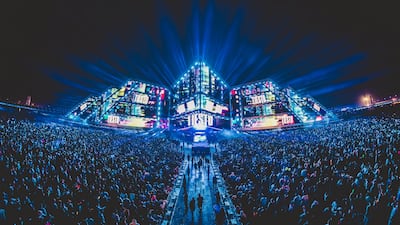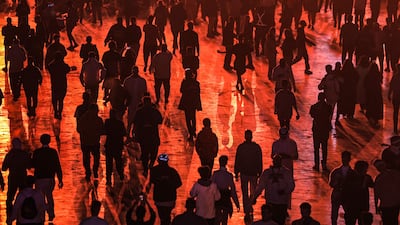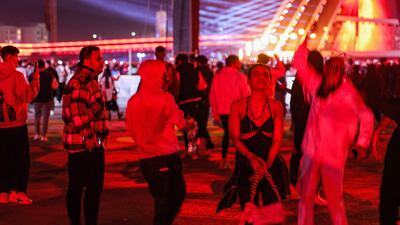Four years ago, Hardwell did the unthinkable.
Ranked No 4 on the DJ Mag Top 100 list in 2018 and the headliner of major dance music festivals, the Dutch spinner and producer announced he was going on an indefinite hiatus.
While the move was unprecedented for a DJ of his fame and calibre, it wasn’t entirely surprising.
That year, 2018, the dance music world plunged into mourning over the death of Avicii, the Swedish DJ who took his own life in Muscat, Oman.
His physical and mental struggles were documented in the unflinching documentary Avicii: True Stories and his death triggered some much-needed industry discussion surrounding the welfare of DJs in the intense and competitive dance music world.
For Hardwell, who by then aged 30 and 16 years into his career, it was time to give his mind and body the rest it craved.
In an exclusive interview with The National, he describes his return to regular performances from March as being as refreshing as it is calibrated.
"I now really enjoy being on the road and I have put a limit on myself of doing a maximum of 40 shows a year, because it then gives me time to work in the studio and spend time with family and friends,” he says.
“I really feel that I am enjoying the most of life and that makes me a happier person and I think people see that on stage."
A much-needed conversation
This is a far cry from the preceding years, when the sheer adrenalin of the shows couldn’t offset the increasing weariness of constant travel and more than 100 shows in 12 months.
Hardwell understands how the glamorous life many DJs portray online makes such complaints sound hollow.
"That is the point in that we do need to talk about this without people thinking that we are bragging," he says.
"Listen, people know that I appreciate everything I have in my life and I love what I do, but when you get to a certain point that you are so tired that you are not looking forward to the next tour, that you don't want to make music in the studio any more, then this is the biggest sign of burnout.
“When I reached that moment, I realised that I do need the break."
The benefits had a revitalised Hardwell drop his superb new album Rebels Never Die in September and perform a ferocious set at Saudi Arabia’s Soundstorm festival in December.
Hardwell now wants to help seasoned and aspiring DJs find their own sense of balance.
In December, he appeared in a provocative session on mental health as part of the XP Music Futures conference in Riyadh.
The remixer and record producer says such discussions are needed to inspire the wider dance music industry to build an effective framework and initiatives to tackle mental health experienced by artists, who are predominantly young.
"There is no right guidance when it comes to DJs. For example, if you are a professional sportsman you have a whole team looking after your health.
“Even for [non-EDM] singers, they get to go on tour and come back and take time off to work on their album," Hardwell says.
"For some reason, we DJs are working to our limit. There is pressure to play the shows, do social media, make music, prepare the DJ sets and now with many DJs having their own radio show, that has to be done too.
“The workload is crazy and you have to ask if this is the way that we need to do it because it is like working five full-time jobs at the same time.”
Help among friends

Hardwell disagrees with the idea DJs should unionise to demand better work conditions.
Effective change, he says, begins when sectors of the industry forego the zero-sum attitude pervasive within the scene.
"It is hard to demand something like this and I don't think it is to be done through an organisation but from the DJs themselves," he says.
"It is just not necessary to do 200 shows a year. You can be good with doing 30 shows a year, because that can make you financially stable and give you more time to work on your music and be with your family.
“Now I know at the beginning all these shows seem fun because you work so hard to achieve them.
“Ten gigs become 40 gigs a month and you just want to go and play everywhere because you are living your dream.
“But then, after two years of this, you realise you are tired and it's not so fun. We need managers and booking agencies to be more aware of the physical and mental health of the artists."
In the meantime, while we hope the EDM scene eventually dances to a different tune when it comes to mental health, Hardwell — real name Robbert van de Corput — is content to build his career to his own rhythm.
His re-entry to the DJ Mag Top 100 at 43rd place this year is a far cry from his No 1 position in 2013, but he truly sounds on top of it all.
















